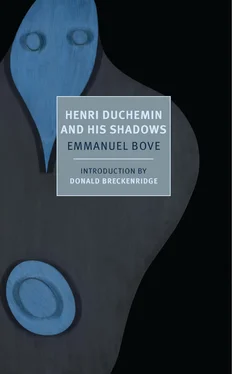Little by little, however, he began to feel at ease. No one was making fun of him. The customers went so far as to get on well with him for, one by one, glasses in hand, they came to his table.
“Music! Music!” he cried.
Although he realized he had raised his voice, it did not bother him.
The barmaid slipped two coins into the piano slot.
“How about a game of poker?” asked a young man who was entertaining himself shuffling a deck of cards.
“Good idea!” cried Henri Duchemin.
The young man spread out a small red carpet. The center of a slate was wiped clean. The deck was cut and the game began.
It did not last long.
Even though Henri Duchemin did not know how to play, he kept on winning. The other players, at the ends of their resources, had to give up. They were not happy and conversed softly.
Their bad mood annoyed Henri Duchemin. He could not explain to himself how he had won; he never had any luck. And so, for fear of alienating his friends, he suddenly gave them back all the money he had won.
Stunned, they stopped speaking. Then, having recovered, they thanked him with exaggerated warmth. In their entire existence, they had never known such a generous man. He was a true friend, no doubt about it! And might the whole world follow his example!
Henri Duchemin rejoiced at the thought of having so many friends.
“Let us be brothers,” he said with eyes raised.
He was not crying, but tears were streaming down his cheeks. He glanced at the woman next to him.
“I am so happy! Life is so wonderful! What is your name, my child?”
Not receiving a response, he continued:
“Allow me to kiss you. Oh! If you were to accept, we’d get married. I have money. I’d buy you everything you wanted. I’d rescue you from this dive. You are too pure to live here. We would love one another.”
He stopped talking when he realized he could no longer be heard over the laughter.
“Please! Be quiet, let him speak,” said a customer, winking in case anyone took his words seriously.
“My friends, if you’d like, we’ll never leave each other. Love will unite us until death. I have money. Why should I have any and not you? Let us share, share.”
This time, all hell broke loose. Everyone cheered him, except the woman next to him who pinched him under the table.
“Why should we despise one another? Let us love each other, let us show the way, we who are brothers.”
He rose amid the cheering. For a second he thought about throwing his wallet to his admirers, but something held him back. He simply threw down a handful of bills.
“Take it, my friends. My true friends. It’s for you. Are we not brothers? And you, my darling, be happy like the others. I love you, life is beautiful.”
“Let’s go,” she said.
“Where?”
“To my place.”
The room filled with boos.
“No!”
“Leave him with us.”
“He amuses us!”
“She wants the money.”
Everyone was speaking at the same time, and Henri Duchemin began to sense that they did not like him. The ugliness of life appeared to him. Until then, as long as they had been listening to him, he had lived in a dream.
Now, everything was finished.
Head in hands, he walked to the door. They begged him to stay, but it was useless.
Standing on the sidewalk he tried to hear through the door what was being said about him, but only a murmur reached his ears.
He wiped his lips so the cold would not chap them. He now knew that all men were ingrates. And let them stay that way! Henri Duchemin had no need to worry about them. He could do without the entire world because he was rich.
He had been walking for an hour when the idea came to him to return to the new house where he’d killed the banker. No matter how he tried to convince himself that there was no point in doing so, the temptation was too great.
Hoping to lose his way, he wandered aimlessly, his hands scraped by the walls; yet in spite of himself, each step brought him closer to the house.
Suddenly he saw shapes moving behind the lit windows of a building. He drew closer. He recognized the new house. Two police officers, whose shadows stretched to the middle of the road, were chatting in the entranceway.
The crime had been discovered.
Henri Duchemin thought about turning himself in. But, changing his mind, he fled. His unbuttoned overcoat floated behind him. A gust of wind carried off his hat. He was getting ready to chase after it when he had the feeling time was running out.
Bareheaded, he took off at a run. Arc lamps lit a boulevard from above. The stores’ metal shutters were drawn down to the sidewalk. Against the darkened café storefronts, cane chairs were stacked one atop the other.
Upset by the loss of his hat, Henri Duchemin did not dare look at the few pedestrians he encountered.
For the second time, he thought of turning himself in, but the law terrified him. He was familiar with it because he had already ventured into criminal court with Monsieur Leleu. With a flushed face, he had pushed open the heavy padded doors. They had seen lawyers whose feet seemed huge beneath their robes. He had found not peaceful city policemen, but municipal guards dressed in the same sky blue as soldiers.
No, he would not turn himself in. It was better to remain free, for these heartless people would never understand the reasons behind his crime. Indeed, no one would understand them. He would have been happier among madmen in whose company he would have skipped, laughed, and sung.
Henri Duchemin heard the rumbling of a carriage. In the silence of the night, the noise terrified him. He imagined a prison van was following him and that the little slanted shutters were hiding policemen.
But the noise faded and he relaxed.
Not daring to return home or to take a room in a hotel because they might have his description, he went into a train station.
There was no one in the main hall, which was cheerless like all places abandoned by the crowd. In the distance locomotives sat idle. A lantern swayed to the rhythm of footsteps.
Henri Duchemin entered a waiting room and walked over to a sheet-metal stove that blew little puffs of warm air through the openwork toward his face. From time to time his gaze would meet the staring eyes of a traveler who was awake.
Sleepiness was making Henri Duchemin’s eyelids heavy and, like a horse, he dozed standing. His head fell forward.
Suddenly shouts rang out.
His teeth chattered. He shivered. He looked at the room. Newspaper photographs shading a lamp formed dark squares. People were getting up.
“Passengers for Dijon, Mâcon, Lyon, and prison, all aboard,” shouted an employee.
He had been found out.
Terrified, he stepped over packages and, running, opened a door that slammed when he was already far away.
Soon he stopped. The street was deserted.
I’m so foolish! he thought.
He wanted to retrace his steps, but though he was sure he had been tricked by his imagination, he did not dare.
* * *
Henri Duchemin was overcome by such an enormous desire to sleep that he closed his eyes as he walked—but not for long, because he was afraid of veering off course.
A lantern, like a common star, was twinkling in the distance. He had no reason to be anxious; people had every right to light lanterns. Still, he did not take his eyes off it because it seemed to him that on this night everything that was lit was lit because of him.
As he approached this lantern, he could read, etched in its blue paint: “Police Station.” So, without turning around or paying attention to the streets he ran down, he fled.
When he was out of breath he stopped and began to think. Wasn’t it ridiculous to be afraid like this when he possessed a fortune? In the morning, everything would be better.
Читать дальше












